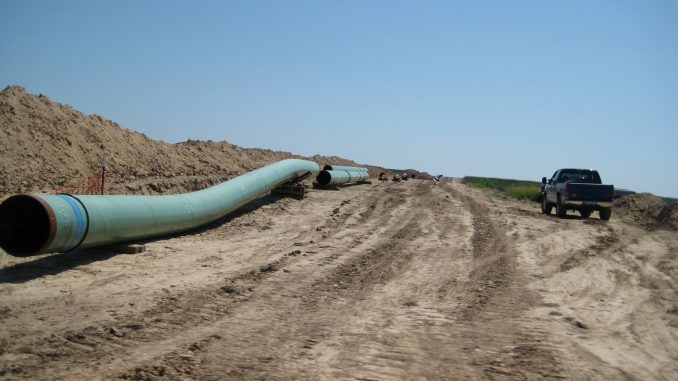
North Dakota Attorney General Wayne Stenehjem filed an amicus brief last week that opposes a possible ruling to vacate the easement granted by the Army Corps of Engineers for the Dakota Access Pipeline. Such a ruling would effectively shut down the 570,000 bbl/day crude oil pipeline.
Judge James Boasberg issued a ruling in March that the Corps’ analysis of DAPL was inadequate and ordered the agency to reexamine it and issue an updated environmental impact statement. Now the judge is considering whether to withdraw the pipeline easement while the EIS is completed, asking parties to comment on the seriousness of the EIS’s deficiencies, and the “disruptive consequence” that vacating the easement would cause.
The state’s brief indicates that shutting down the pipeline would cause “a serious reduction in economic output in North Dakota and corresponding loss of tax revenue to the state.” The state’s contention is backed up by declarations submitted by state Budget Director Joe Morrissette, state Tax Commissioner Ryan Rauschenberger, Mineral Resources Director Lynn Helms, and ND Pipeline Authority Director Justin Kringstad.
In his declaration, Morrissette outlines the importance of oil tax revenue to the state budget. He said if the DAPL shut down resulted in a decrease in oil production equal to the 570,000 bbl now transported by the pipeline, “the reduction in state oil and gas tax revenues would be approximately $2 billion during a two-year budget period, based on the current official revenue forecast.”

Rauschenberger’s declaration points out the millions in property taxes paid to counties by DAPL. He also notes that “North Dakota realized an estimated $317 million in additional Gross Production Tax revenue due to the decreased shipping cost and higher price received for oil on the Gulf Coast.” He said if DAPL is shut down, “those increased oil tax revenues would disappear as production is shut in or diverted to higher-cost modes of transport.”
Lynn Helms’ declaration states that because of a lack of adequate rail takeaway capacity, shutting down DAPL would force thousands of producing oil wells to be shut in, resulting in a loss of jobs and tax revenue. He said restoring the wells to production could cost as much as $400,000 per well, and history suggests that many would be permanently abandoned.
In his declaration, Kringstad also points out the lack of takeaway capacity and in-state refining capacity for the state’s crude production. He also notes the negative consequences a DAPL shutdown would have on other stakeholders, including the state, royalty owners and midstream companies.
Reply briefs from the plaintiffs (Standing Rock and other Sioux Tribes) are due May 20. Reply briefs from Dakota Access and Corps are due May 27. A decision will likely be issued in mid-June.
List compiled by Western Energy Dakota Association.
The Crude Life Podcast can be heard every Monday through Thursday with a Week in Review on Friday.
Spread the word. Support the industry. Share the energy.

